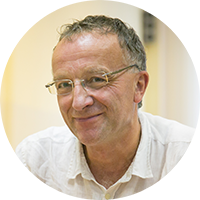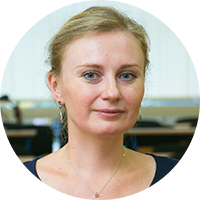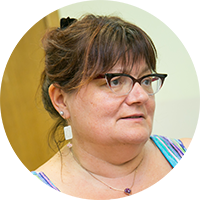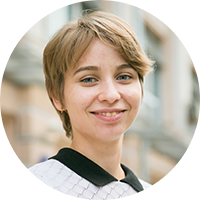From Ancient Inscriptions to Blogs: Different Disciplines’ View on Ego Texts
HSE has held its post-graduate humanities summer school 'History in the First Person: From Antiquity to Our Time'. The summer school was dedicated to texts written or recorded in the first person, as well as to various methods for analysing them. The school’s organizers and participants spoke with the HSE news service about what ego texts are, how representatives of different disciplines work with them, and how French methodology differs from Russian.
Oleg Voskoboynikov, historian, Tenured Professor at the Higher School of Economics
In the late 20th century the status of personal experience, and even discourse – abandoned by chance yet recorded by history – changed dramatically in the humanities. Figuratively speaking, history discovered direct speech, which is heard in ego-texts – correspondence, diaries, autobiographies, poetry, memoirs, confessions, denunciations and interrogations, interviews, notarial acts and memorial books from medieval monasteries. The carriers of such information, which range from ancient inscriptions to interviews and medieval manuscripts to blogs, are as diverse as the methods used to analyse them. The development of these methods over the past two decades has significantly enriched the dialogue with societies of the past and has opened up promising new avenues for research.
We conceived of the school with our Parisian friends Alain Blum and Larisa Zakharova in 2013 right after a cooperation agreement was signed between HSE and the School for Advanced Studies in the Social Sciences in Paris. We were later joined by Emilia Koustova of the University of Strasbourg, where there is a long tradition of Slavic Studies, and Hélène Mélat of the Centre of Franco-Russian Research in Moscow. As a result, HSE now has an excellent team of French specialists who have a strong knowledge of Russian culture and psychology. We have virtually no restrictions in terms of geography or period of history. The purpose of the school is to learn how an individual’s voice sounded and was recorded in texts throughout history – from antiquity to the present day – and what research strategies can and should be used by experts from different disciplines to identify this voice.
Historians, philologists, and philosophers ask different questions of both historical facts and the texts where they are recorded, but as it turns out during debates, they have quite a lot in common
The interdisciplinary nature of such a school is self-evident; one of its main tasks was to create conditions for professional conversation among researchers who come from different backgrounds, use different methodological tools, and take different approaches to the study of ego-documents.
As for historians, I am convinced that we need to constantly reflect on what historical fact is, how it is recorded, how we should analyse it, and what lies behind it. And the outside perspective is not the perspective of an historian but rather that of a participant in the events, which even if biased may help in seeing the different layers of reality behind one fact and one text. Historians, philologists, and philosophers ask different questions of both historical facts and the texts where they are recorded, but as it turns out during debates, they have quite a lot in common.
For example, when the writer Anna Berdichevskaya describes life in the Gulag, what is she describing in reality when she tells the story about her mother? After all, there are several stages of information processing between the reality of the Gulag and us, sitting in a classroom and listening to the report of a student who is taking an interview. First, it was the will of Berdichevskaya’s mother, her ability to express an idea, and her willingness or unwillingness to tell something. Her silence is also an historical fact. Second, it is her daughter’s thoughts on what she heard from her mother; the result of these thoughts is a recorded story. Third, there is the work that editors and proofreaders do with the printed version of this story. And fourth, there are the mind, heart and voice of our rapporteur who interviewed Berdichevskaya, and this voice of the researcher makes its transformation to the past.
At the school, we were able to bring 30 such voices to the classroom – 20 French and 10 Russian. Naturally, most of the reports were on the 20th century, but there were a few reports on antiquity, the Middle Ages, the Renaissance and the modern era. To some extent, I feel as though I am a French envoy to our university, and for me it was important that almost all of these voices were heard in French – a language with a rich intellectual tradition. I am convinced that the humanities will die if such national intellectual traditions that are entitled to their languages are lost.

Alain Blum, historian, demographer, Professor at the School for Advanced Studies in the Social Sciences (Paris)
We chose a theme that allows experts from different fields to find interesting topics for themselves. We have been cooperating with HSE for a long time, and I think that we already have a tradition of working together; this school has once again confirmed that we understand one another. We brought quite a few French students to the school, and the extent to which they could work here productively and in an intellectually enriching way (in many ways due to the fact that the school was French speaking) confirms that we have truly managed to establish cooperation.

Larisa Zakharova, historian, Professor at the School for Advanced Studies in the Social Sciences (Paris)
In French the name of this school – À la première personne, écritures de soi de l’Antiquité à l’époque contemporaine – sounded like ‘History of the First Person: From Antiquity to the Modern Day’, but I think it would be more precise to say ‘From the First Person: Ego-Texts from Antiquity to Our Time’. The second option better reflects our idea of holding an interdisciplinary gathering. With the peculiarities of translation, it seems that from the Russian side historians were the main ones to express interest in the conference, but from France there was a variety of disciplines – philosophers, historians, philologists, anthropologists, and linguists. However, in the end, we really managed to go beyond the disciplinary framework and show historians how ‘their’ object of research is seen by other scholars.
Over the course of the three days, we saw three approaches to the analysis of ego-history. The first can be called ‘demarcation’, which implies very clear disciplinary boundaries, with representatives speaking only from the perspective of their field and not showing particular interest in what is happening in other disciplines. The second approach is ‘integration’, when we are enticed by the idea of being interdisciplinary, borrow approaches from other disciplines and apply them mechanically without thinking about the fact that this transfer involves an epistemological shift. The third approach is ‘conversationalism’ – a transfer of ideas and approaches developed in one discipline to another in which there is a correlation of methodologies and concepts of two fields. This approach is just beginning to appear at the school, but I am certain that it will be the starting point for something more substantial.

Hélène Mélat, literary historian, Centre of Franco-Russian Research (Moscow)
I have been studying contemporary Russian prose for quite some time. It’s still a very interesting topic, as cultural life in Russia has remained dynamic. Although it’s not the same as it was in the 1990s, but still... Here you can feel how society is changing and how literature is changing with it. You can feel the drive for change that fuels culture, and how marginal art becomes mainstream.
As for the topic of the conference, my interest is related to the huge layer of ego-texts (memoirs, diaries, etc.) that are published in Russia. Today, everyone is ready to write something, for example, about how they lived in the 1990s. A separate discourse has been formed – a special type of writing about oneself. At its centre is an individual storyteller. Together with the multitude of specifics and descriptions of the smallest details of everyday life that seem to have no relation to big history, a picture of an era is emerging that you will never see in a textbook.

Irina Mastyaeva, 2nd year Master’s student, ‘Historical Knowledge’ programme
When philosophers start talking about the internal and external ‘I’ that is heard in a text, they do so quite unlike historians would. When literary historians work with memoirs or letters (what are called ego-texts or ego-documents today), it is obvious how they work in a different way and draw other conclusions. During these three days, I constantly felt the need for translation from the language of one discipline to that of another; this is the challenge and the essence of the school.
Since I study medieval France, I found an academic conference on the French language interesting. On the one hand, I saw it as an opportunity to practice the language in which I have to read much of the literature and write. On the other hand, it was an opportunity to once again admire the French academic methodology. When you read French studies, their three-part structure sinks in and becomes something native. Even my French teachers, who do not see themselves as fans of the French system, eventually return to it. They attribute this to the fact that their academic culture of thinking (and writing) goes back to Descartes, so they are systematic and logical. We have learned something from them, and I hope that we have also taught them something.
See also:
‘We Cannot Understand the Modern Ideological Confrontation without the Accusations that Emerged during the Lausanne Process’
Rainer Matos Franco, from Mexico, defended his PhD thesis with honours at HSE University this June. In his dissertation, Rainer Matos Franco examines the history of anticommunism in Europe during the 1920s. The HSE News Service spoke with Rainer and his academic supervisor, Tatiana Borisova, about the significance of the Lausanne Process for the Cold War and contemporary history, the opportunities provided by HSE University for international PhD candidates, and the challenges of working with a vast database of historical sources.
'These Are Unforgettable Impressions, I Will Cherish Them Forever'
HSE St Petersburg International Summer School is in full swing—right now, international students from 12 countries are attending lectures and enjoying the cultural programme. The HSE News Service talked to the participants about their most vivid impressions.
HSE University-St Petersburg Hosts Students from 12 Countries at the International Summer School
On July 10, HSE University-St Petersburg launched the International Summer School—a series of classes for students from India, Vietnam, the Republic of Korea and other countries. Foreign guests are getting to know the university, attending lectures in six fields of study, and enjoying an inspiring cultural programme.
The XI Russian-Chinese Summer School on International Relations Kicks Off at HSE University
On July 1, 2024, the opening ceremony of the XI International Russian-Chinese Summer School on International Relations, titled ‘Partnership and Cooperation in the New World Order,’ took place. The event was organised by the HSE Faculty of World Economy and International Affairs in collaboration with HSE Centre for Comprehensive European and International Studies (CCEIS). Graduate and postgraduate students from various countries have come to Moscow to study international relations and collectively envision a new world order.
How the Telephone Conquered the World. Episode Ten: 'Number, Please?'
The history of the invention of telephony reads like a captivating detective novel, but even more intriguing are the events that contributed to the worldwide adoption of this technology. In this series of columns on IQ.HSE, Anton Basov, HSE Faculty of Computer Science editor, discusses how telephones have become an integral part of our everyday life. The final episode of the series recounts how men were unable to cope with telephone operator jobs and were replaced by tall and polite young women. However, as telephone networks expanded, the role of the intermediary became unproductive, eventually rendering the switchboard operator profession obsolete due to automation—not the first nor the last time such a thing has happened. As for Alexander Graham Bell, he used the earnings from inventing the telephone to promote science, educate people about the world around us, and pursue new inventions.
How the Telephone Conquered the World. Episode Nine: Big Connections
The history of the invention of telephony reads like a captivating detective novel, but even more intriguing are the events that contributed to the worldwide adoption of this technology. In this series of columns on IQ.HSE, Anton Basov, HSE Faculty of Computer Science editor, discusses how telephones have become an integral part of our everyday life. The ninth episode of the series explores the development of the first long-distance, interstate, and transatlantic telephone lines, which suddenly made people thousands of kilometres away feel as close as if they were in the same room together.
How the Telephone Conquered the World. Episode Eight: The Russian Field of Experiments
The history of the invention of telephony reads like a captivating detective novel, but even more intriguing are the events that contributed to the worldwide adoption of this technology. In this series of columns on IQ.HSE, Anton Basov, HSE Faculty of Computer Science editor, discusses how telephones have become an integral part of our everyday life. The eighth episode of the series recounts how Russia first adapted the telephone for military and logistical purposes, created a shell company headed by a nominal executive for reselling the rights to Western competitors, and intensively developed communication infrastructure in the country's two capitals, making such progress that Vladimir Lenin insisted on capturing and maintaining control of telephone exchanges at all costs.
How the Telephone Conquered the World. Episode Seven: German Efficiency
The history of the invention of telephony reads like a captivating detective novel, but even more intriguing are the events that contributed to the worldwide adoption of this technology. In this series of columns on IQ.HSE, Anton Basov, HSE Faculty of Computer Science editor, discusses how telephones have become an integral part of our everyday life. The seventh episode in the series recounts the story of German bureaucrats, who proved to be the most astute in Europe by ensuring effective telephony first for themselves and subsequently for all major cities in Germany. However, even there, the government's dominant role over the free market slowed down the adoption of the new technology.
How the Telephone Conquered the World. Episode Six: The Telephone's Misadventures in France
The history of the invention of telephony reads like a captivating detective novel, but even more intriguing are the events that contributed to the worldwide adoption of this technology. In this series of columns on IQ.HSE, Anton Basov, HSE Faculty of Computer Science editor, discusses how telephones have become an integral part of our everyday life. The sixth episode of the series recounts events in France when the private owner of the telephone network was compelled to sell it to the government at a knockdown price, and the impact it had on the development of communications in the country. Spoiler alert: the impact, naturally, was detrimental.
How the Telephone Conquered the World. Episode Five: From the US Free Market to Conservative Britain
In this series of columns on IQ.HSE, Anton Basov, HSE Faculty of Computer Science editor, discusses how telephones have become an integral part of our everyday life. The fifth episode of the series chronicles the early experiences of the telegraph and telephone in Great Britain, shedding light on the challenges they faced, and explores the adverse impact of excessive government regulation and nationalisation on the evolution of telecommunications.


